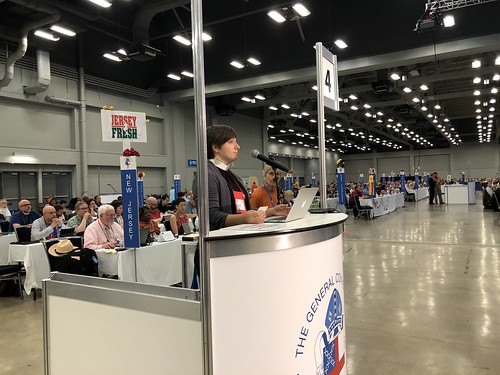No matter which resolution passes both houses during this General Convention (A068 or A069 or another yet-to-be-created resolution), I support a careful process of prayer book revision. I also think The Episcopal Church is not ready for this revision process. There must be a way to allow for immediate trial use liturgies while also being patient with the discernment and deliberation process. Also, we should focus on discipleship and evangelism – the growth of the church – rather than enter the schismatic waters of prayer book revision.
I went to divinity school as a new Christian and a non-denominational evangelical and became an Episcopalian at St. Joseph’s, Durham. There, I encountered The Book of Common Prayer, 1979 (BCP) and its people bravely living the Way of Love among the students and homeless by praying the Daily Office and eating family-style breakfast together. Like many of my millennial seminary classmates, I felt myself drawn to tradition but with an eye toward inclusion. Using the ’79 prayer book, I simultaneously felt nurtured by words that were not my own, ancient prayers that nourished me, yet these same words grated against my ears and smacked of a dying colonial and privileged legacy. Language like “thou” and “thee” and the exclusively male language for God troubled me, but I also grew to trust the many saints praying in the ’79 BCP. I fell in love with the Episcopalians and their prayer book and adopted it as my own.
Learning to love The Episcopal Church meant, for me, learning to love a church with flaws and internal disagreements. The Church is filled with fallible humans, after all, and always requires forgiveness. I fell in love with and joined the Episcopal Church not because the liturgies were to my liking, or “adequately inclusive”, but because I saw that I needed catholicity and a Communion more than I needed inclusive language. I saw that Anglicans try to invite everyone under a “Big Tent”, a via media, a tent that stands for unity against the increasing polarization of our world and the schisms in the church. To me, The Episcopal Church is trying to honor its ancient wisdom while dealing constructively with its colonial and privileged legacy, all while enlarging healing relationships between historically privileged and oppressed groups. But this means that being in the Anglican Communion comes with a heavy responsibility. Being in Communion means that I walk the Way of Love and do not always get what I want or deserve in order to stay in relationship with others. It means that when we seek to enlarge our liturgical Tent, we need to move with careful discernment and generosity to keep everyone within the tent as it grows.
No matter what prayer book revision resolutions pass during General Convention, I consider generosity of spirit, gentleness, and kindness paramount. We need to seek diplomatic ways to keep and enlarge our Big Anglican Tent while also encouraging, for those who need them, the immediate trial use liturgies (Ex: Resolution D078). As a Big Tent Communion, we need to carefully deliberate, so that one day we, together, might make a new prayer book that reflects all of us, with nobody left behind.
I hope that the appropriate bodies will create resources in these next three years to prepare for deliberation. For example, we need time to create an annotated ’79 prayer book that has footnotes about our worship, scriptural, historical and liturgical notes to aid understanding about where our prayers come from (I hear that Fr. Willoughby from Savannah is working on one). We can’t deliberate the future without first understanding our past and present story. And for Anglicans, our story is etched very precisely into our prayer books. If such an annotated BCP was disseminated widely, laity and clergy alike could study and discern and make informed choices about what should change and what should remain. Common prayer, maintaining the Big Tent, requires precision and patience with history, current complexities and coming cultural shifts. As someone who intentionally stepped away from congregationalism and joined the Anglican Way, I hope we will champion being in Communion over special interests, prioritize catholicity over polarization and equally uphold justice and mercy. I hope we demonstrate kindness above all else.
As I stated, I would rather us be focused on grassroots discipleship and evangelism rather than prayer book revision. Studying the prayer book we have with the above-mentioned recommendation would help with this. It is well known that revision of our common prayer brings much internal debate which easily grows into outright strife and, sometimes, schism. With a Presiding Bishop like the one we have, I believe we should not lose this wave of courage starting to swell in the Episcopal branch of the Jesus Movement. That is where our focus should be, no matter how discipleship and evangelism takes shape on the local level. Growing in spiritual depth (discipleship) and articulating the Gospel in enticing ways (evangelism) are dominical mandates, Jesus’ own priorities for his Big Tent.
My prayer this week has been this one from Bishop Steve Charleston, and it seems appropriate to these issues facing us:
“God bless the church: our traveling tribe, our motley crew, caravan of the conflicted and courageous, stumbling toward paradise, the hurt and the hopeful, wounded healers, singing along the way.
“Life within her tents is never easy, but life without her would be darkness beyond our imagining.
“Bless the church, dear God, your quarreling brood, your stubborn flock, your love living for love, yours dream of what might be.”
Amen.


Well said.
Thanks you and God’s peace to you.
Great perspective Kelly. Blessings.
This is beautifully & powerfully articulated, Kelly! Thank you.